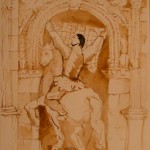Welcome back. It has been a harrowing couple of weeks anticipating the impact of what was expected to be a Category 5 hurricane. Thank heavens we were spared the worst, but it has been difficult for so many. It is at times like this that book group communities are so vital. We realize that not only do we read together, but we also care about each other. Discussing literature is a remarkable bonding experience, and I am so grateful for all the women I have learned from over these many years. I am really looking forward to seeing all of my book friends in October when we start our season.
I just finished my second reading of The Castle Cross The Magnet Carter, and I found it as astonishing as I did the first time. That is not to say that it is a perfect book—it is not. But, its imperfections are meaningless when viewed against Corthron’s achievements. The novel is a huge American saga, with two sets of brothers at its center. Around them swirl a multitude of characters and themes. Although the author tackles what I see as the quintessential American crisis, that of racism, it is also a brilliant examination of justice and injustice. In fact, Corthron’s novel might just be her own “Magna Carta.â€
The book explores the themes of poverty, income inequality, anti-Semitism, sibling rivalry, education (segregation/integration), family, domestic abuse, drug abuse, friendship/betrayal, paternity, rape, homosexuality, interracial relationships, fate and destiny, the North and the South, and coming of age (innocence/experience). Clearly, The Castle Cross The Magnet Carter examines every issue Americans have wrestled with from 1940-2017.
So, how does an author organize an epic of this enormity? Well, she structures the book with eight big sections, not always chronological and often alternating voices. What is the effect of her structure? How does this underscore the themes?
Who is the hero of the novel? And, what constitutes a hero in this author’s world?
What do the characters, their actions, and their cultures tell us about good and evil?
Is it possible, according to the novel, to overcome racism? If so, how?
There are two quotations at the end of the novel worthy of attention.
The first is Dwight’s: “It’s a beautiful and remarkable thing to live by our conscience….it’s pointless and indulgent to live by our guilt.â€
The second is BJ’s: “But, as I’ve grown older, I’ve come to realize how reductive it is to define an entire clan by just one event, even if that event was a cataclysm of the first order.â€
How do these observations help the reader to understand the scope of the novel?
The other novels for the 2017-2018 season are:
The Narrow Road to the Deep North by Richard Flanagan
Moonglow by Michael Chabon
Outline by Rachel Cusk
The Sympathizer by Viet Thanh Nyugen
The Inheritance of Loss by Kiran Desai
Swing Time by Zadie Smith
Our last novel has not been selected, but I think The Invisible Man would be an apt bookend for The Castle Cross The Magnet Carter.
Stay tuned for comments on each novel as the season progresses.

